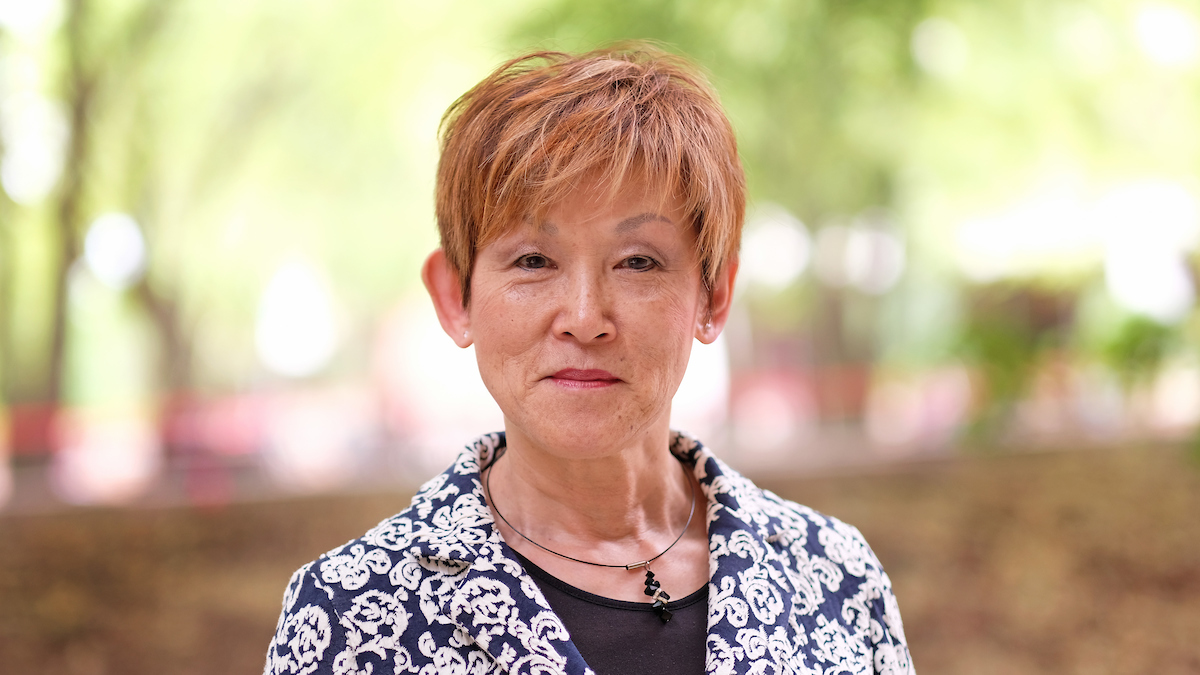
Associate Professor of Sociology Chikako Usui’s recognition as the 2018 Connector of the Year comes after a decade of serving as president of the Japan America Society of St. Louis. (Photo by August Jennewein)
When she first arrived in the United States, Chikako Usui let out a celebratory sigh of relief.
“Now I am free,” she thought to herself in a short-lived euphoric moment.
An undergraduate looking to complete the last year of her degree, Usui believed she finally had the freedom to explore a new culture and move beyond her home country of Japan. But she soon discovered that she could never fully shake her cultural roots.
As she met new groups of people, her conversations followed a similar pattern: “Why did you come from Japan? What do you like about American culture? What are the major differences between the two countries?”
“The moment I came to the U.S., people always asked me about Japan,” Usui said. “I wanted to forget about Japan when I arrived. But I found that as I left my own country, I had to know more about it because I was constantly surrounded with people who asked about the culture. Whether I liked it or not, I had to be quite well-educated.”
Decades later, Usui, now an associate professor of sociology at the University of Missouri–St. Louis, is still challenged by variations of those questions, both in her conversations with Americans and when she visits Japan.
She’s come to embrace her role as a liaison between the two countries, though, and has helped to elevate education and cultural awareness in the communities where she resides.
During the last 10 years, she has served as president of the Japan America Society of St. Louis, a nonprofit organization housed within International Studies and Programs at UMSL. Usui accepted the role in 2008 when the JASSTL was more of a dormant body than a thriving organization. She’s helped revitalize the group in the years since through volunteer recruitment, corporate sponsorships, grant funding and strategic planning.
The Asian American Chamber of Commerce of St. Louis recognized these efforts earlier this month when Usui received the 2018 Connector of the Year award at its annual Connections Dinner.
“Every year, the AACC awards a Connector of the Year to either the person who connects our immigrant community to the mainstream business community or connects St. Louis businesses and organizations to the same in part of Asia,” AACC President Al Li said. “In this case, Dr. Usui exemplifies both.”
Usui recently transitioned from president to chair of the JASSTL. During her tenure, she has helped the society advance its number of corporate partnerships and build its program portfolio.
One of JASSTL’s largest contributions is as a coordinating partner for the annual Japanese Festival. The event draws more than 30,000 visitors to the Missouri Botanical Garden for a three-day celebration of Japanese culture and history through art, food, dance and music.
Usui also played a vital role in building a friendship program between St. Louis and the Japanese city of Ishinomaki. The program, which ran from 2013 to 2016, took shape following a 2011 earthquake and tsunami that killed nearly 4,000 people in Ishinomaki.
The St. Louis-Ishinomaki Friendship Program served as a cultural and educational exchange, coordinating Japanese residents to spend time in the U.S. and Americans to visit Japan.
Anna Crosslin, president and CEO of the International Institute, said Usui’s impact on the JASSTL is evident in numerous ways.
“As an organization, there is a before Chikako and after Chikako when it comes to the JAS,” Crosslin said during a video presentation played at the Connections Dinner.
As Usui navigated her leadership roles, she has taken a trained sociological approach.
“In many ways, these last 10 years of experience have been sociology in action,” Usui said. “What I have learned in books, what I teach about organizations and organizational management and communication, those have in many ways been put into practice.”
While Usui said she is humbled by the AACC award, she takes the greatest delight not in the recognition but in the relationships she’s formed because of her involvement.
“Along the process, I met a lot of talented individuals who wanted to contribute,” Usui said. “This connector award is about connecting with people, connecting with groups, connecting with organizations. In that sense, it’s very labor intensive. But no matter what you do, people to people, communicating and working with them has a lasting effect.”














